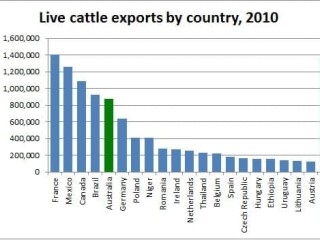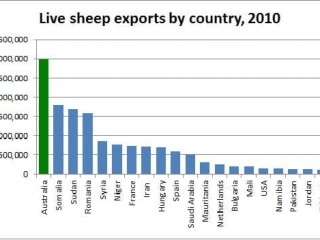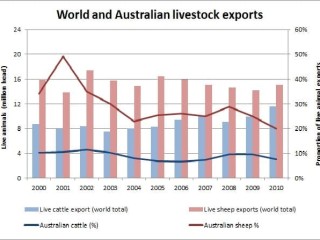Much of the public discussion about Australian participation in live sheep and cattle exports over recent years has been to the effect that Australia should ban livestock exports, and instead focus on processed meat exports. The rationale has been that livestock exports are a dying industry globally, and Australia could generate more value from processing livestock domestically and exporting that product.
A review of Australian and global livestock export trends, contained in the most recent Australian Farm Institute Insights newsletter, highlights how misguided such thinking is.
Three simple graphs highlight the reality of global trade in live animals, and the role that Australia plays in the trade.


 The first two graphs show the numbers of live cattle and sheep exported by Australia and other nations involved in the trade for the most recent year that complete international statistics are available. They highlight that while Australia has an important role in the trade, there are many other nations also involved and competing for available markets.
The first two graphs show the numbers of live cattle and sheep exported by Australia and other nations involved in the trade for the most recent year that complete international statistics are available. They highlight that while Australia has an important role in the trade, there are many other nations also involved and competing for available markets.
The third graph is probably the most important. It highlights that Australia's share of global markets has been declining over recent years, while the number of live sheep traded internationally has remained relatively static, and the number of live cattle traded has been steadily growing.
This confirms that a reduction in livestock exported from Australia simply results in the demand being met from alternative sources, and does not reduce global livestock exports.
In both markets, the share of the trade accounted for by livestock sourced from developing nations has been steadily increasing, and it goes without saying that none of these nations has animal welfare standards and international livestock trade protocols that are anywhere near the equivalent of the Australian system.
The graphs reinforce the absolute fallacy that animal welfare standards in importing countries would somehow be improved by withdrawing from the market. Australia's withdrawal would simply hand these markets to competing exporters, and none of them have any programs in place to improve animal welfare standards in destination countries.
Australia has been, and can continue to be a force for improved domestic animal welfare standards in destination markets, while at the same time generating economic activity in rural Australia. Abandoning live exports would mean abandoning both these outcomes.
This article first appeared on the Australian Farm Institute website. To view original article click here
To view graphs in larger format click on images below:
